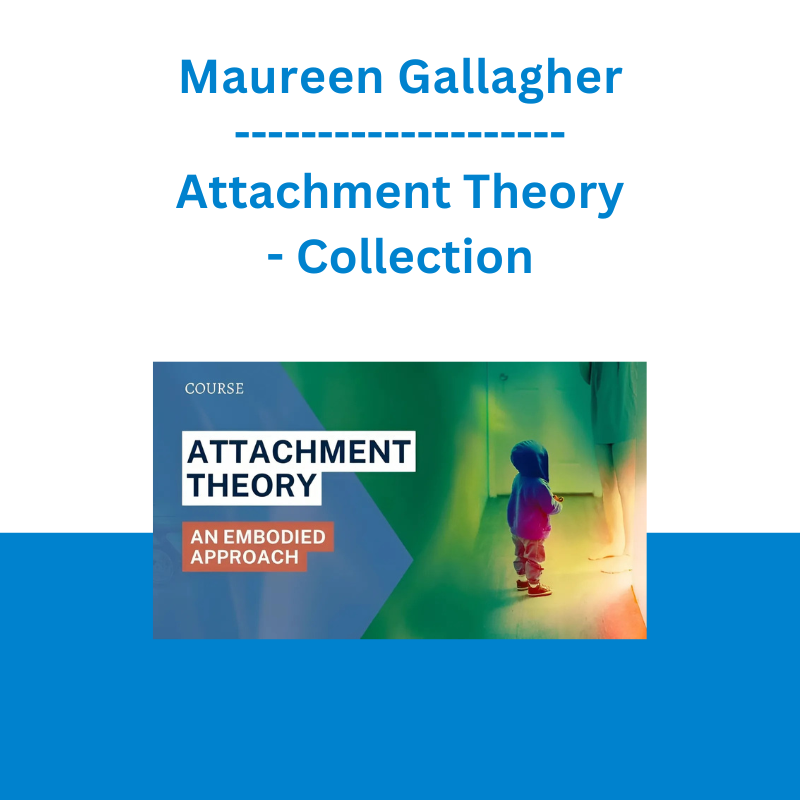*** Proof of Product ***
Exploring the Essential Features of “Maureen Gallagher – Attachment Theory – Collection”
About
Our attachment system is laid down early in life, and is a combination of our genetic inheritance and our response to our perception and experience of our environment. We experience attachment ruptures as serious threats to our survival, and create strategies to deal with this based on our unique nervous systems.
These strategies rely on the functioning of our autonomic nervous system. The knowledge of polyvagal theory can help us to understand and work with our own and our clients nervous systems.
This course will aid mental health practitioners and other related healing disciplines to recognize attachment dynamics and address them in therapeutic settings such as psychotherapy.
MODULE 1: The Attachment and the Novel Response Systems
This module explores the attachment system which is activated when we experience relational distress, activating strategies developed in relation to the environment and relationships we were raised in.
MODULE 2: Polyvagal Theory and Attachment Strategies
Polyvagal theory outlines a hierarchy of response to threats, from those least costly in terms of survival energy to those most costly. This understanding of the nervous system underpins many attachment strategies.
MODULE 3: Sympathetic Dominance and Hyperactivating Attachment Strategies
Insecure attachment can come in the form of hyperactivating strategies, which rely on sympathetic dominance, or mobilizing to secure attachments. In this module, we’ll examine anxious/preoccupied strategies, how to understand them, and how to begin to be with the impact of this strategy.
MODULE 4: Parasympathetic Dominance and Hypoactivating Strategies
Insecure attachment can come in the form of hypoactivating strategies, which rely on parasympathetic dominance, or withdraw/freeze/collapse to secure attachments. In this module, we’ll delve into avoidance/dismissive strategies, how to understand them, and how to begin to be with the impact of this strategy.
MODULE 5: Mixed States and Disorganized Attachment Strategies
This module looks at how trauma and terrifying or terrorizing early environments can contribute to disorganized or fearful avoidant attachment strategies which have a dominant insecure strategy or mixed state strategies.
MODULE 6: Tend/Befriend and Appease Strategies
Tend and Befriend studies suggest Appease as a further strategy that may have roots in the social engagement system. This is based in co-regulatory strategies to increase perceptions of safety, or neuroception.
Students who take this course will:
Describe the relationship between the attachment system and the threat response system
Demonstrate a basic understanding of the Polyvagal theory and the implications of the Polyvagal theory on attachment strategies
Compare secure vs. insecure adaptive strategies and hyperactivating vs. hypoactivating strategies
Explain the mixed states of the autonomic nervous system
Compare the relationship between sympathetic dominance and anxious/preoccupied strategies and parasympathetic dominance and avoidant/dismissive strategies
Describe disorganized and fearful avoidance attachment strategies
Explain Tend and Befriend research
Describe the Social engagement system and explain the relationship between the social engagement system and co-regulation
Author
Maureen Gallagher
Dr. Maureen Gallagher is a Licensed Psychologist (NY, NJ), Somatic Experiencing Practitioner and Faculty Member, Inner Relationship Focusing Trainer, Emotionally Focused Therapist and Supervisor and a Relational Psychoanalyst. Her work and teaching are dedicated to the embodiment of psychotherapy and related healing disciplines, in which she integrates somatic awareness and the use of somatic intervention along with adult attachment work and a relational focus. She brings a broad range of experience and training to this endeavor, including Certifications in Somatic Experiencing, Inner Relationship Focusing, Relational Psychoanalysis, Emotionally Focused Therapy, Integral Somatic Psychology, SE Touch skills training and Biodynamic Cranial Sacral Therapy. Her clinical work integrates focusing, somatic experiencing, relational psychoanalysis and experiential and process oriented models of attachment theory. She has maintained a private practice for over 20 years. She is the founder of Embodying Psychotherapy
Please see the full list of alternative group-buy courses available here: https://lunacourse.com/shop/









